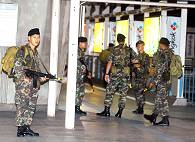2006年VOA标准英语-Military Seizes Power in Thailand(在线收听)
By Ron Corben
Bangkok
19 September 2006
 Thai soldiers on the streets of Bangkok |
||
----
Troops under the command of General Sondhi Boonyaratglin took up positions around Bangkok late Tuesday. Military officers said they had taken control of the government, revoked the constitution and shut down most arms of the government.
The military declared Wednesday would be a holiday, closing banks, the stock market and schools.
As the coup got under way, Prime Minister Thaksin Shinawatra, in New York for the United Nations General Assembly, declared a state of emergency in the capital. He also ordered General Sondhi out of his post.
The coup leaders ignored Mr. Thaksin's actions, and issued a statement on television, appealing to the public to remain calm. A spokesman for the coup leaders said the military action was a result of the country's deep divisions and called on military personnel to remain in their barracks.
The official says the 1997 constitution had been canceled and the country would emerge as a democracy with King Bhumipol Adulyadej as the leader. But the Privy Council - the key advisory body to the king - and the courts would continue to function.
Mr. Thaksin canceled his planned speech before the United Nations General Assembly. It was not clear if, or when, he would be allowed to return to Thailand.
Thailand has experienced 18 coups or coup attempts since it became a constitutional monarchy in 1932 - the last time in 1991.
Tuesday's coup brought to a head rising tensions between officers supporting Sondhi and those allied with Mr. Thaksin.
Kraisak Choonhavan, a Thai senator whose father, General Chatichai Choonhavan, was ousted in the 1991 coup, says military intervention had become inevitable. "And I think the key to understand this event is probably Mr. Thaksin wants to take out the existing military hierarchy altogether and put his men in and have total control over Thailand," he said.
Political tensions in Thailand have been rising over the past year as street demonstrations called for Mr. Thaksin to step aside because of allegations of abuse of power and corruption.
The prime minister called a national election in April, but opposition parties boycotted it. The courts later nullified the vote and a new election had been tentatively set for next month. Recently, the election commission indicated the vote would be moved to November. It is not clear now when elections will be held.
Mr. Thaksin, 57, is a former police officer and a business tycoon. He was elected prime minister the first time in 2001 and was re-elected in 2005.
Many voters were particularly angered early this year when the prime minister's family sold its stake in the telecommunications company he founded, but did not have to pay taxes on the deal, which was worth nearly $2 billion.
Some analysts say they expect many in the Thai urban middle class to welcome the coup.
However, Mr. Thaksin remains very popular among poor and rural voters, who had benefited from his policies that cut costs for health care, provided greater access to low-cost loans and offered funds for rural development.
The United States says it is monitoring the situation and urged the Thai people to remain calm.